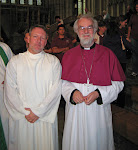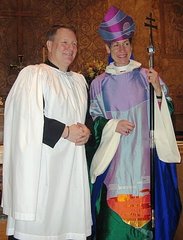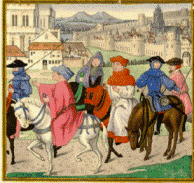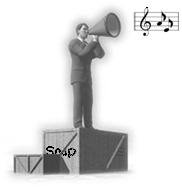Preached on the fourth Sunday of Easter, April 13, 2008 at St. James Episcopal Church Fordham Manor. Scripture readings this sermon is based on can be found here.
+ In the name of Christ Jesus, Amen. My father’s farm is in the hill country of West Tennessee, where the landscape begins to hint at the existence of the Great Smokey Mountains further eastward. The gentle rolling hills are thickly wooded in most parts, so pasturelands are often separated from one another; and are usually bounded by hills and forests.
My father’s farm is in the hill country of West Tennessee, where the landscape begins to hint at the existence of the Great Smokey Mountains further eastward. The gentle rolling hills are thickly wooded in most parts, so pasturelands are often separated from one another; and are usually bounded by hills and forests.
A significant part of my father’s working day is about ‘going to check on the cows’. He loads a sack of feed into the back of the pick-up truck. Dogs and people pile into the cab of the truck and we drive sometimes a mile or two over gravel roads to get to one of his pastures where his cattle are grazing.
After the gate is safely closed behind us, my father blows the horn of the pick-up three times. Now, after years of driving over rutted gravel roads, the horn on the pick-up truck is woefully out of tune. It gives off more of a bleat, than a honk. But in a few minutes of that out-of-tune bleat, over the hill or through the woods, come my father’s cows.
My father takes out his pocket knife and opens the sack of feed, something called “Ranch Cubes” which are considered quite the bovine delicacy. He tilts the sack over his shoulder and spreads the feed in a line -- about 20 feet long or so -- on the ground. The cows all gather along this makeshift manger, and begin to feed. My dad walks through the group of heifers and calves, counting, checking ears and eyes for infection. He notes the progression of those heifers that will bear calves in a few weeks or a month. And he looks to the health of the nursing mothers, and the development of their young. As he does so, the cows will gently move aside, some will nuzzle his gloved hand, and he’ll scratch their heads were new horns may be coming in.
The cows all gather along this makeshift manger, and begin to feed. My dad walks through the group of heifers and calves, counting, checking ears and eyes for infection. He notes the progression of those heifers that will bear calves in a few weeks or a month. And he looks to the health of the nursing mothers, and the development of their young. As he does so, the cows will gently move aside, some will nuzzle his gloved hand, and he’ll scratch their heads were new horns may be coming in.
His cattle know him; they know his voice, and the off-pitch bleat of his truck horn. They are mistrustful of a stranger; they do not know my voice or my smell. They shy away from me, but under his hand they are calm, and are at peace.
The Gospel of John from which our reading today is taken is not a gospel of calm or of peace. It is a gospel of conflict, and of division. The term “The Jews” appears 70 times in the gospel of John compared to twice in Matthew, and not at all in Mark or Luke. And it is meant to carry the disapproval and condemnation that so grates on our post-Holocaust ears. It is in John’s gospel that Jesus is seen as one with the Father. The gospel begins with the astonishing claim that Jesus of Nazareth is the Word made flesh, a claim that seems to deny the monotheism that was a the defining element of Judaism -- a claim that would have grated on the ears of first century Jews.
And there is a new word in John that appears no where else in the New Testament, and no where else in all of the Jewish literature of the time: aposynagogos. To be cast out, or put out, from the synagogue. Most scholars agree that the Gospel of John is the last of the gospel accounts to be written. It is a biography of Jesus like Matthew, Mark and Luke, but it is also an autobiography of the community that gathered around John, the beloved disciple --that developed along different lines from the Apostolic that grew up around James and Peter in Jerusalem and the churches Paul founded in Corinth, Ephesus, and Galatia and throughout the Roman empire. As an autobiography of a specific community of believers, the Gospel of John gives evidence of the rough and tumble period of early Christianity when there were many churches struggling to be faithful to the teaching of Jesus, in different places and in different ways.
Most scholars agree that the Gospel of John is the last of the gospel accounts to be written. It is a biography of Jesus like Matthew, Mark and Luke, but it is also an autobiography of the community that gathered around John, the beloved disciple --that developed along different lines from the Apostolic that grew up around James and Peter in Jerusalem and the churches Paul founded in Corinth, Ephesus, and Galatia and throughout the Roman empire. As an autobiography of a specific community of believers, the Gospel of John gives evidence of the rough and tumble period of early Christianity when there were many churches struggling to be faithful to the teaching of Jesus, in different places and in different ways.
This John community accepted the membership of Samaritans, as the account of the Woman at the Well tells us. The John community has experienced conflict with the religious establishment -- “The Jews” -- and had been cast out of their houses of worship. The Gospel of John’s very exalted view of Jesus as the Word made flesh that existed before the creation of the world, would have sounded like blasphemy to most Jews and many Jewish Christians in that time.
So this community of the Beloved Disciple is one that is no stranger to conflict. It has been cast out of the synagogues where most Christian initially worshipped. It has accepted the hated Samaritans as fellow believers. It has come to believe that Jesus is son of God, and very God himself.
Our gospel reading today from John comes just after the healing of the man born blind, an event that caused much consternation for the Pharisees and that led the man born blind’s parents to fear being forced aposynagogos, out of the synagogue.
So, when Jesus says in today’s reading that there are those who are thieves and bandits it is the Pharisees and the other religious forces in the community to which he refers, who would drive out the John community for reveling in the revelation of Jesus as God Incarnate and who have doubtlessly caused the John church so much pain.
There is no doubt that we live in times just as contentious as those we hear about in our readings today. These are times of contention in our church, in our communities, and in our nation. We are at war in Iraq and Afghanistan, and there is unrest in Nigeria, Tibet, Columbia. Some of these conflicts are as old as are our national issues around race, they seem never to come to resolution or reconciliation.
What are we to do in situations such as these? Where are we to turn in times of religious conflict like those found in John, or in our reading from Acts this morning where an argument about the different treatment afforded the Hebrew and Greek widows erupts -- and in which Stephen -- the first deacon -- is taken from the synagogue and stoned to death?
Where do we turn in times of different understandings and interpretations of the faith? Who is it that we are supposed to follow? Who do we look to for guidance when war breaks out, and when tempers flare on street corners, in political debates and in parish meeting rooms?
There are often loud and angry voices in situations such as these. Lots of people have lots of opinions. You can find all kinds of opinions on cable news channels and all over the Internet. There can be real confusion, and real difference of opinion. And hearing so many different opinions and so much criticism -- and to hear so few voices calling for understanding and reconciliation -- all this noise can make us fearful, anxious, even angry.
Noisy, confusing times such as these are times that call for a holy listening. Jesus assures us, we will know his voice when we hear it. It is he who will call us by name. It is he who will lead us through the gate to the pastures of peace, and will not cast us aside. Through him, the good shepherd, the gateway to salvation, we will find the word of truth and pastures of calm and of peace.
In times of conflict, sometimes it is not best to add our voices and opinions to the fray, perhaps we are to engage in holy listening for the sound of what our ears and our hearts will tell us is the voice of our Savior calling to us to follow.
Now, don’t get me wrong. I believe in speaking up and speaking out. I think that all too often, we are silent when the truth of our lives -- our own gospel truths -- is exactly what the world needs to hear. And after we’ve said our piece, then we should do our best to hear what our brothers and sisters are saying.
When there is conflict over how we will relate to each other as Anglicans, or how we can better relate to each other as black folks and white folks or how we here at St. James are to be one body of Christ, though we are West Indians and West Africans and African Americans with different faith traditions and customs. We are brothers and sisters in Christ Jesus -- and we are always that, no matter what -- we are many sheep of one flock, with one shepherd whether we are Hellenists or Hebrews, as one body in Christ Jesus, one flock, we need to listen to each other with very great care.
We are brothers and sisters in Christ Jesus -- and we are always that, no matter what -- we are many sheep of one flock, with one shepherd whether we are Hellenists or Hebrews, as one body in Christ Jesus, one flock, we need to listen to each other with very great care.
Because when we listen with the ears of our hearts, we will hear the truth, we will hear the voice of the Savior calling to us, guiding us forward, showing us the path of righteousness and the way of peace.
We may hear our shepherd’s voice in the words of a sermon, or in the stories we share at coffee hour, in the hymns we sing, or the voices of our children reciting the psalms like they did just a few Sundays ago.
We may hear Christ’s voice in the account of the veteran returned from war, in the cries for freedom from the Buddhist monks of Tibet, in the silence of the poor and the oppressed.
We’ll know it’s our Savior’s voice when it calls us to act with mercy and forgiveness, when it calls us to work for justice and for peace, when we are urged to take on new challenges, to be reconciled with our enemies, to live in love with one another to forgive, to love and to serve.
For the one we are seeking to hear is no ordinary shepherd, the King of Love our shepherd is, and it is in love that he seeks us, and on his shoulder gently laid, home, rejoicing he leads us….
+ Amen.
15 April 2008
Sermon for Year A, Easter 4: "Holy Listening"
Subscribe to:
Post Comments (Atom)







No comments:
Post a Comment